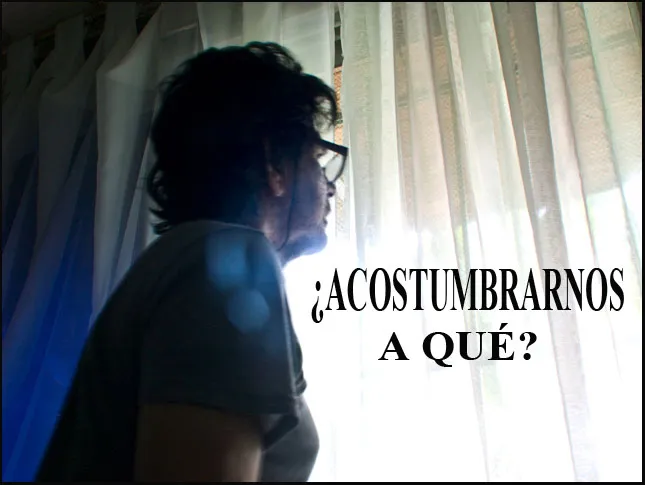
Es un lugar común decir que “el hombre es un animal de costumbre”. En eso hay hasta una base biológica en la que no me voy a detener.
Hay costumbres sanas que nos hacen la vida más fácil. Así, por ejemplo, si “nos acostumbramos” a beber agua en ayunas nuestro cuerpo se libra de toxinas y potencia la energía para comenzar el nuevo día. De igual modo, si cultivamos “la costumbre” de hacer ejercicios tendremos mucho más chance de llevar una vida libre de dolores articulares, entre otras cosas.
Es nuestra elección cultivar tal o cual tipo de costumbres, porque ciertamente las costumbres no nacen con nosotros, las adquirimos en nuestro proceso de aprendizaje.
Pero hay costumbres que —con un gran atrevimiento de mi parte— voy a llamar negativas. Hago la aclaratoria en resguardo del derecho que tiene cada quien de ver las cosas como mejor le parezca…

Dos personas de una pareja pueden “acostumbrarse” a vivir sin amor, en una atmósfera donde incluso puede estar presente la violencia. Establecen una “normalidad” donde se gritan, se ofenden, se maltratan, y se rodean de infelicidad. Allí la costumbre actúa como una fuerza paralizante que no dejar ver opciones. La gente “se acostumbra” a vivir mal, sin que ello los impulse a buscar alguna salida.

En una escala un poco más grande podemos “acostumbrarnos” a que unos mal vivientes, como son guapos y apoyados, nos impongan normas de convivencia, como a qué hora podemos salir de nuestras casas, qué sitios podemos visitar, y pare de contar. Nos “acostumbramos” a vivir en la arbitrariedad dictada por alguien.
Nos “acostumbramos” a pensar que somos impotentes para exigir un trato respetuoso y acorde con nuestra condición de seres humanos.

La idea de este escrito me surgió al revisar el feed. Siempre hay un buen número de publicaciones que hablan de problemas personales: gente que se va del país, gente que tiene percances de todo tipo, gente que deja diferentes testimonios de malestar. Estas publicaciones son completamente normales, puesto que estamos en una red social integrada por personas de carne y hueso, y los que dejan ese tipo de escritos quizá esperan algún tipo de acompañamiento y solidaridad.
Por eso me llama la atención que publicaciones como las que menciono queden huérfanas de comentarios. ¿Está instalada entre nosotros la “costumbre” de la indiferencia…?
Hay quienes opinan que la cantidad de problemas existentes en el mundo, rebasa en mucho nuestra capacidad de atenderlos, en eso quizá tienen razón. Se escucha mucho que poco podemos hacer, y ante lo que no podemos resolver lo más inteligente es dejarlo pasar. Total, sostienen los partidarios de esa forma de pensar, nuestra vida es corta para emplearla en esfuerzos inútiles.

No sé si seré exagerado, pero creo que se ha hecho “costumbre” el pensar que solo debo ocuparme de mis asuntos, y los demás que vean como resuelven.
En la vieja escuela donde me formé se insistía mucho en otra cosa distinta, en la solidaridad, que entre otras cosas implica el involucrarse en los asuntos de los otros.
Reconozco que me cuesta entender muchas cosas de este tiempo. Sé que al igual que todos yo también soy un animal de costumbre. Pero dudo mucho que en el tiempo que me quede por vivir logre acostumbrarme a la indiferencia y la falta de solidaridad, aceptar eso no puedo…
Gracias por tu tiempo.
Autorretratos hechos con la OLY-E500. Edición Photoshop.


It is a commonplace to say that "man is an animal of habit". There is even a biological basis for this, which I will not dwell on.
There are healthy habits that make our lives easier. For example, if we "get into the habit" of drinking water on an empty stomach, our body gets rid of toxins and boosts energy to start the new day. Similarly, if we cultivate the "habit" of exercising, we will have a much better chance of leading a life free of joint pain, among other things.
It is our choice to cultivate this or that kind of habits, because certainly habits are not born with us, we acquire them in our learning process.
But there are habits that - with great boldness on my part - I am going to call negative. I make this clarification to protect the right of each person to see things as he/she sees them...

Two people in a couple can "get used" to living without love, in an atmosphere where violence may even be present. They establish a "normality" where they yell at each other, offend each other, mistreat each other, and surround themselves with unhappiness. There, habit acts as a paralyzing force that does not allow to see options. People "get used" to living badly, without being driven to look for a way out.

On a slightly larger scale, we can "get used" to the fact that some bad people, because they are handsome and supported, impose rules of coexistence on us, such as at what time we can leave our homes, what places we can visit, and so on. We "get used" to live in the arbitrariness dictated by someone.
We "get used" to thinking that we are powerless to demand respectful treatment in accordance with our condition as human beings.
The idea for this writing came to me while reviewing the feed. There are always a good number of posts that talk about personal problems: people leaving the country, people having mishaps of all kinds, people leaving different testimonies of discomfort. Looking at it closely, it is normal that in a social network like this one, made up of people of flesh and blood, these types of publications are made, perhaps hoping for some kind of accompaniment.
That is why I am struck by the fact that publications such as the ones I mention are left without comments. Is the "habit" of indifference installed among us...?
There are those who believe that the number of problems in the world far exceeds our capacity to deal with them, and perhaps they are right. We hear a lot that we can do little, and when faced with what we cannot solve, the smartest thing to do is to let it go. In the end, say the supporters of this way of thinking, our life is too short to spend it in useless efforts.

I do not know if I am exaggerating, but I think it has become a "habit" to think that I should only take care of my own affairs, and let others see how they solve them.
In the old school where I was educated, there was a strong insistence on something different, on solidarity, which among other things implies getting involved in the affairs of others.
I recognize that it is difficult for me to understand many things of this time. I know that like everyone else I am also a creature of habit. But I doubt very much that in the time I have left to live I will be able to get used to indifference and lack of solidarity, I cannot accept that...
Thank you for your time.
Translated with www.DeepL.com/Translator (free version)







Te invito a apoyar este proyecto como witness y a formar parte de esta gran comunidad uniéndote a su Discord en el siguiente enlace:
Discord de la comunidad Cervantes

